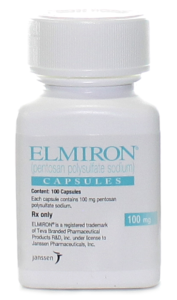
Between 4 and 12 million people in the United States suffer from bladder or pelvic pain, most of them women. If you’ve struggled with interstitial cystitis or painful bladder syndrome, you may have taken Elmiron or generic pentosan polysulfate sodium (PPS) to treat the pain and discomfort. In fact, Elmiron is the only FDA-approved treatment for IC.
So it’s alarming to hear that in the last few years, studies have found generic and brand-name Elmiron can cause irreversible and permanent eye damage in patients taking the medication.
- In 2018, the American Academy of Ophthalmology (AAO) released new findings of patients developing pigmentary maculopathy while taking Elmiron.
- In 2019, the AAO published a study (“More Evidence Linking Common Bladder Medication to a Vision-Threatening Eye Condition”) showing that nearly 25% of patients suffered vision problems after taking Elmiron over a long period of time.
- In 2020, researchers at Emory Eye Center at the Emory School of Medicine began to record cases of retinal damage in IC patients using Elmiron.
- In January 2020, the European Medicines Agency published a paper requesting expert medical opinions on the risk of eye injury for Elmiron patients. The Agency, which is the European version of the U.S. Food & Drug Administration (FDA), recommended that Elmiron patients get regular eye exams at the ophthalmologist.
- In February 2020, the Interstitial Cystitis Network wrote that “they urge patients who have used or are using pentosan to be screened by ophthalmologists if they are experiencing any unusual eye symptoms (difficulty reading, vision loss, difficulty seeing in lower lights) and to cease pentosan therapy if eye disease is present.”
In May 2020, the American College of Obstetricians and Gynecologists published an article by researchers from Emory University who found a link between vision loss and patients taking Elmiron long-term for interstitial cystitis. They found that:
- Affected patients had difficulty reading and adjusting to low lighting
- Some of those patients developed severe visual disability
- The eye damage associated with Elmiron also resembles age-related eye disease, which has caused patients to be misdiagnosed
If you’re taking Elmiron, talk to your doctor right away about the newly established risks of this drug. Your doctor may recommend that you see an ophthalmologist to get checked for eye disease if you’re experiencing any problems with your vision.
If you find out that you’ve experienced eye damage as a result of taking Elmiron, you may feel angry and betrayed. You trusted that the medication you took was safe. You expected to be aware of all the risks before taking the drug. If you’d known that your medication would damage or cause you to lose your eyesight, you probably wouldn’t have taken it. Chances are your doctor wouldn’t have prescribed it to you if they’d known, either.
Loss of vision is a significant injury that changes your life in profound ways, physically and mentally. Most of us rely so much on our vision. You could become unable to do your job and earn a living in your field. You could end up with a new medical diagnosis to worry about on top of your IC. This means even more medical treatments and bills.
Patients who have taken Elmiron and developed eye damaged are suing the manufacturer, Janssen Pharmaceuticals. In their lawsuits, they claim that Janssen:
- Knew or should have known about the risks of eye damage from taking the drug
- Had the responsibility to make sure patients knew the risks of the medication
- Failed to properly test the medication before making it available to patients
- Failed to warn patients about the dangers of taking Elmiron
In addition, the lawsuits accuse Janssen of continuing to manufacture and distribute Elmiron despite knowing of the unacceptable risks to patients. As of this writing, Janssen has failed to recall the drug despite increasing numbers of studies showing the risks to patient vision. In fact, the company has stayed silent on the matter. Elmiron’s packaging includes no mention at all of the risk of eye damage from taking the drug.
If you’ve been hurt because of a pharmaceutical company’s irresponsible behavior, a lawsuit can help you recover for the injuries and damages you’ve suffered.
Harlan Law is currently taking cases of patients across the United States who have developed eye damage after taking Elmiron. We are dedicated to protecting patients and you’re not alone. Call our office at (619) 870-0802 for a free consultation of your case.
Elmiron Eye Damage and Vision Loss Problems: What We Know
The FDA approved Elmiron in 1996. It’s now been on the market for over 20 years. Most patients take the medication for a minimum of six months, at three 100 mg doses per day. Some patients may take Elmiron for years or even decades to help with urinary and pelvic pain.
Recently, doctors have linked Elmiron to eye problems including maculopathy, an eye condition that can cause progressive blindness. Eye damage and vision problems may be more likely in patients taking Elmiron or its generic pentosan for long periods of time.
Maculopathy involves progressive loss of vision in the center of your eye and usually affects both eyes. The disorder affects the central part of the retina and can severely impair your sight.
- Age-Related Macular Degeneration is a type of maculopathy that happens naturally over time. The eye damage linked to Elmiron can get mistaken for this condition.
- Pigmentary Macular Degeneration “of unknown etiology,” the condition associated with Elmiron, has no known cause. Patients can show different types of symptoms.
- Retinal Maculopathy is a progressive degeneration of the retina causing vision loss that has also been linked to Elmiron.
If you’ve been affected by Elmiron-related eye damage, you may experience:
- Dark spots at the center of your vision
- Dimming, spotty, or blurring vision
- Difficulty reading or seeing close objects
- Eyes are slow to adjust to the dark
- Central vision loss (paracentral scotoma)
- Distorted vision or vision disturbances, like straight lines appearing curved
- Hyperpigmented or dark spots on the retina
- Eye pain or discomfort
It’s frightening to find out that a medication you’re taking can cause a terrible side effect. Although the studies are scary, you don’t have to panic. You have options.
You generally shouldn’t stop taking a drug you’ve been prescribed without first talking to your doctor. If you’re currently taking Elmiron or you’ve taken it in the past, contact your doctor right away. They can help you manage your treatment and monitor your health. Your doctor will probably have you see an ophthalmologist to determine whether you have any eye damage.
If you’ve developed vision problems after taking Elmiron, you deserve to be compensated for your losses and injuries. Our law firm can help you recover for:
- Costs of medical treatment as a result of injuries caused by Elmiron
- Lost wages, opportunities, and past or future earnings
- Physical and mental pain and suffering
- Temporary or permanent disability
Harlan Law has fought for the rights of patients for years. We are passionate about holding companies responsible for the injuries that they cause. Our firm is ready to file cases of patients who have been harmed after taking brand name or generic Elmiron/pentosan.
Contact our personal injury law offices today at (619) 870-0802 for a free, no-risk consultation of your case. We’re here to listen. Learn more about our personal injury practice here.
Because the developments around Elviron are so new, there may be thousands of patients out there who continue to take the drug without realizing what recent studies have found. Share this post to spread the word about this dangerous drug.




